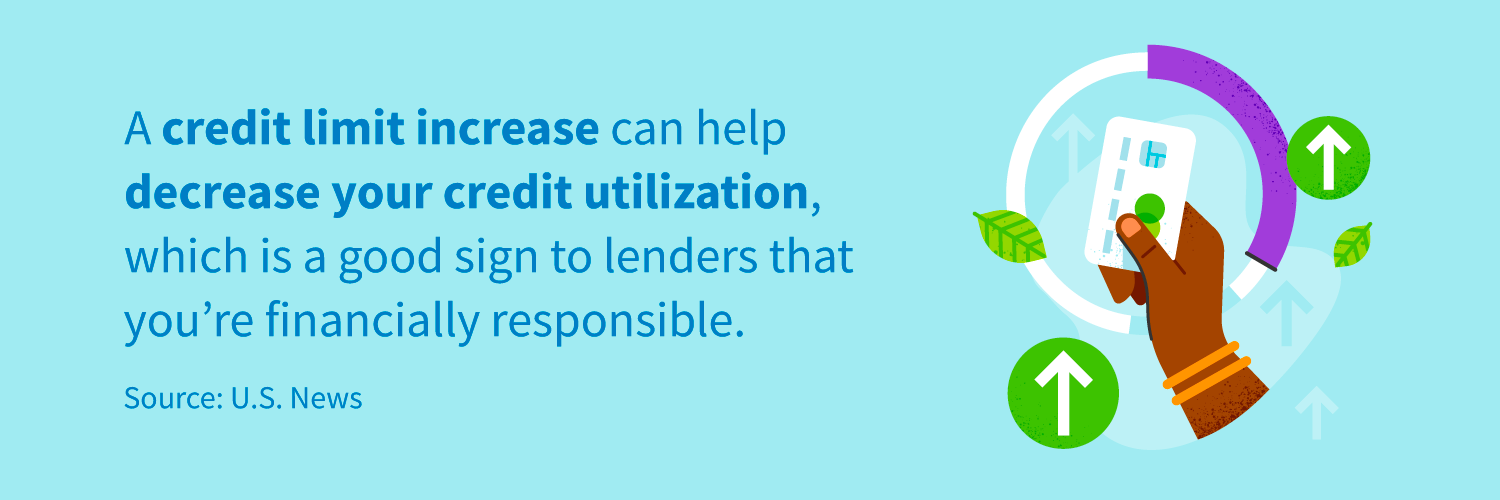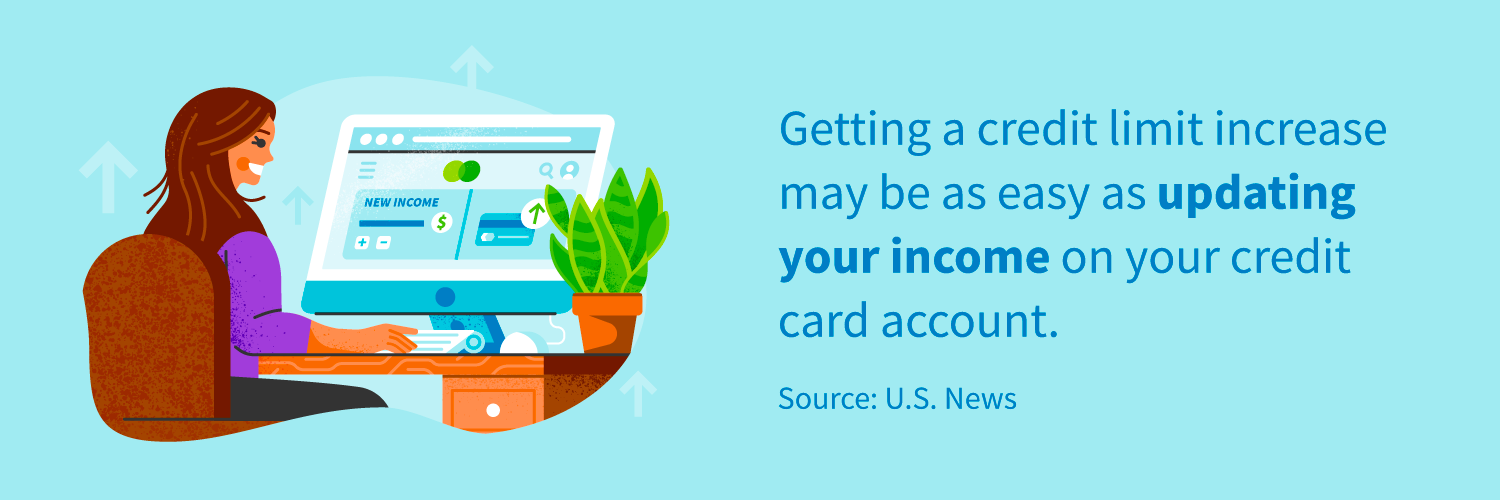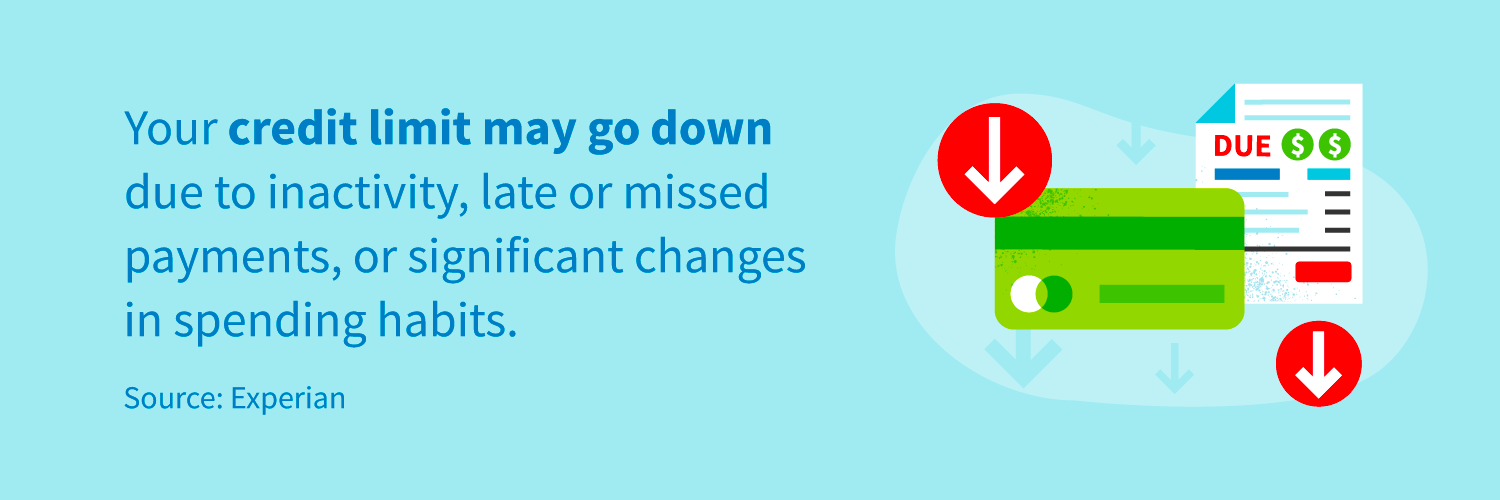
Disclosure regarding our editorial content standards.
A credit limit increase can affect your credit score in a negative way for a limited time if the card issuer does a hard inquiry. On the other hand, an increase can also raise your score by decreasing your credit utilization if you use the card responsibly.
There’s a credit card myth that you should keep your max limit low to prevent the temptation to spend and rack up debt. While the idea behind this myth has good intentions, doing so could actually hold you back from improving your credit score.
Today, we’re going to explain how to increase your credit limit without hurting your score as well as how to properly request the increase. We’ll also help you learn when it’s the right time to make the request so you can get the most benefits and improve your financial situation.
Does requesting a credit limit increase hurt scores?
Requesting a credit limit increase can lower your score temporarily if the card issuer does a hard credit check. In the long run, a limit increase can be beneficial as long as you’re spending responsibly and paying your balance on time.
Requesting a credit increase can have a few results:
- Your credit utilization could lower, which in turn could help boost your score.
- Having a higher credit limit can give you more options when it comes to making larger purchases and expanding your credit history.
- It could trigger a hard inquiry, which could temporarily lower your score, but it’s easy to recover from if you’re responsible with your finances.

Soft vs. hard credit check
When you request a credit limit increase, the card issuer will need to do a soft or hard inquiry into your credit report or even both, according to Ted Rossman, a credit card senior industry analyst at Bankrate.
New credit inquiries are 10 percent of your score with the FICO® scoring model, which means that a portion of your score is affected by how often you apply for new lines of credit. A hard inquiry can drop your score by a few points but only for up to one year. Basically, it’s a red flag to lenders if you’re regularly trying to get credit because it can indicate a higher risk.
Soft inquiries have no effect on your credit score, and you can usually acquire one if the card issuer is a bank you’re already using. For example, if you already have a checking account, savings account or credit card, that bank will often do a soft inquiry.
What is a credit limit?
Your credit limit is the maximum amount you’re able to spend on your credit card. You have a per-card credit limit and an overall credit limit. The overall limit is the total limit of all of your cards combined, and a per-card limit is for each individual card. This means if you request a limit increase, it’s for a specific card, and if approved, it will increase your overall limit.
Credit limits can be established based on a few factors:
- The company you’re applying with
- Credit history
- Credit score
- Debt-to-income ratio
Each credit card company or bank has their own set of guidelines when it comes to establishing credit limits. They’ll evaluate your application based on these parameters and give you a credit limit that they’re confident you’ll be able to pay back—the last thing they want is for you to not pay your bills.
How a credit line increase affects your credit utilization ratio
Your credit limit doesn’t inherently impact your score, but how you use your limit does. The credit limit factors into your credit utilization, and if that number is consistently too high, lenders can see you as a risk.
For example, let’s imagine you have an overall credit limit of $10,000. To stick with the general recommendation of only using 30 percent of your available credit, you should try to spend less than $3,000 monthly and pay it off every time. Anything over that could lower your credit score, and $3,000 is right at the cusp. But what if you requested a credit limit increase?
If you were to request a $2,000 increase and get approved, your $3,000 balance would drop your utilization to 25 percent. For those who barely use their credit card, a limit increase can still help improve your utilization and help you get approved for loans.
How to increase your credit limit
The process to increase your credit limit may be easier than you think
- Gather important information: Have your credit score, a snapshot of your credit history and identifying information ready to share with your lender.
- Update your bank or credit card account: Check your online account—see if your income and other personal information is up to date. If you’ve gotten a raise recently, adding this to your account may be all that you need to get a limit increase.
- Contact your bank or credit card company: Some lenders allow you to request an increase online, while others prefer that you call. This phone number is typically found on the back of your card.

Keep in mind, though, that requesting a limit increase may trigger a hard inquiry. While this may negatively impact your score for a bit, it’s easier to recover from than other hits to your score. Assuming you avoid multiple hard pulls on your credit report within a short period of time, you should be able to get back to that glowing score in no time.
Will I get approved for a credit limit increase?
Most of the time, lenders are pretty happy to give you a credit increase if there are no outstanding red flags on your history. As long as they’re confident that you’ll be able to pay it back, there shouldn’t be an issue with getting the credit increase.
Some of the most common reasons limit increases are denied include:
- You haven’t been with the card issuer long enough
- The issuer may feel your income is too low
- You have missed or late payments
- Your credit utilization is too high
- You have a low credit score
Should I increase my credit limit?
Now that you know how to get a credit limit increase, it doesn’t mean you should rush out and request one. Remember, not only is an approval not guaranteed, but the hard credit inquiry can also hurt your score. If it’s been close to a year since your last increase, though, it may be worth asking. Take stock of your credit situation before asking, and only move forward if:
- You consistently pay more than the minimum amount
- Your balance stays relatively low and your credit utilization rate stays around 30 percent
- Your score is healthy
- Your credit history is diverse
Additionally, there are some life circumstances that may warrant a request for an increase:
- An increase in your income: Having additional income means you have more of a cushion to ensure you can make payments on time.
- A decrease in your income: If you’ve had to take a lower-paying job, having a higher limit can help as you adjust your budget. Due to the decreased income, you’ll need a good payment history and decent credit score to get approved.
- Acquiring peace of mind: Sometimes, situations happen in life where you’ll need additional money due to unforeseen expenses like medical bills. The increase can also help you feel less worried about a potential emergency.
Keeping these factors in mind can help you move toward a healthy credit history and a future of credit limit increases.
Why did my credit limit increase?
If you’re a responsible borrower—meaning you don’t spend beyond your means and you pay your bills on time, every time—it’s very likely that your lender will give you a boost periodically, with no need to ask. Typically, if you have six months to a year of on-time payments under your belt, you work with a healthy utilization ratio and you’ve never maxed out your card, your lender may be inclined to automatically raise your limit.
Plus, if your account information is up to date, including your income level, your lender can see any increases in income and bump up your limit accordingly.
How much of a credit increase should I ask for?
The amount of a credit limit increase depends on your specific situation. First, ask yourself why you want an increase. Assess your needs vs. wants, and make sure you’re not looking for additional credit to spend on things you may not need . But, if you’re hoping to reap the benefits of a credit increase like improving your credit score, a modest increase is a good idea.
An Experian® report from 2021 found that the average credit card limit varied by age:
- Gen Z: $9,857
- Millennials: $22,136
- Gen X: $33,694
- Baby boomers: $38,898
Do these averages mean you should increase your limit to $25,000? It depends on your financial goals. If you’re working on lowering your utilization to improve your score, just be sure the increase gives you enough to stay under 30 percent. If you’re looking to get approved for a major loan like buying a home, then a much higher limit can look good to lenders.
How to avoid a credit limit reduction
What goes up can always come down, and this goes for credit limits as well. This doesn’t have to be the case as long as you know what to avoid. Here are few instances where you may actually see your credit limit be decreased by your lender:
- Inactivity or low credit utilization: Not using enough of your credit limit can result in a reduction.
- Elevated credit utilization: On the other side of the spectrum, using too much of your limit can put you at risk for a reduction. Balance is key.
- Late or missed payments: If you consistently don’t pay on time or enough, your lender may restrict your limit.
- Drastic change in buying habits: If you suddenly start dropping thousands of dollars left and right, your lender may reduce your credit limit to mitigate any issues.
Essentially, if your lender believes you aren’t using the card enough, you’re going overboard or you’re using it irresponsibly, they can reduce your credit limit. They don’t necessarily have to let you know, though—they’re only required to notify you if your limit is cut due to a missed payment, if you make only minimum payments on a high balance or if you show another red flag, according to the Fair Credit Reporting Act.

When it comes to avoiding a credit limit reduction and keeping your credit health in top shape, it’s best to review your credit report regularly to spot any changes and make payments on time, ideally above the minimum amount. To learn
Are credit errors affecting your ability to increase your credit limit?
When it comes to avoiding a credit limit reduction and keeping your credit health in top shape, it’s best to review your credit report regularly for changes and make payments on time, ideally above the minimum amount. Sometimes, what’s preventing you from increasing your credit limit is errors on your credit report.
CreditRepair.com specializes in challenging misreported errors on credit reports, and we could help you too. In addition to repairing credit, we provide a variety of resources to help our members maintain a healthy credit score. To learn more about credit and credit repair services, reach out to our team of credit advisors.
Note: The information provided on CreditRepair.com does not, and is not intended to, act as legal, financial or credit advice; instead, it is for general informational purposes only.
Questions about credit repair?
Chat with an expert: 1-800-255-0263





